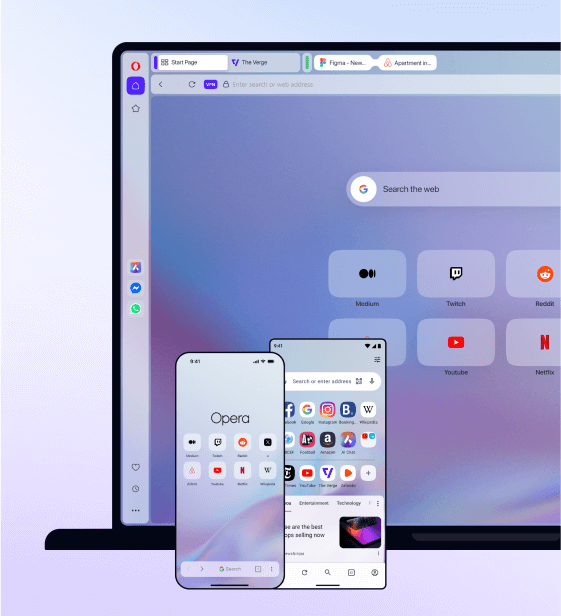Desktop, Mindfulness, Opera Air
How to browse privately

Consider how much of your life revolves around the internet, and how much private information you share online. Do you know how your data is used and who sees it? Every move you make on the web leaves a trace, just like a fingerprint in the real world. In fact, the term browser fingerprinting refers to the collection of the virtual fingerprints you leave as you browse the web.
How is your data collected?
Cookies on websites track your browsing activity: the links you click on, the articles you read, and how much time you spend on a particular website. So it shouldn’t surprise you when, after reading an article about new gaming equipment, you find offers for laptops or graphics cards in ads on websites. Your activity is also tracked by search engines. Depending on the keywords you type, the algorithms try to select search results that will match your tastes.
Small steps for bigger protection
One thing to note first: most of your activity does not reveal your highly sensitive data (such as your credit card number or home address). This doesn’t mean, however, that there’s nothing to worry about. On the contrary, you should start taking steps to protect your privacy overall, and there are privacy features available in browsers to help you regain your privacy online.
Browser privacy features

In response to the constant tracking of users, many web browsers have developed privacy features that help keep your data where it belongs – on your device only. Some of these features, like blocking ads and blocking tracking scripts, are built directly into browsers, while others can be downloaded as additional extensions. It’s important that you know what they are, and that you make use of them if you value your privacy.
Ad blocker
Many browsers now have built-in Ad blockers, and they’re getting better and better at dealing with ads. Ad blockers not only provide a cleaner browsing experience but also block cookies, which further limits the number of ads and information collected about you and your computer. Plus, beyond protecting your privacy, using an Ad blocker speeds up your browsing and saves memory.
DNT – Do Not Track
A Do Not Track feature is also available in many browsers. When enabled, it sends a signal with a message: “Please don’t track me” to websites. As a result, fewer of your movements are recorded through reduced browser fingerprinting, and analytics data is not processed. No tracking means no targeted ads, and no information about you and your computer ends up on the sites you visit. You can use an integrated tracker blocker from Opera – no additional addons are needed.

Virtual Private Network (VPN)
A VPN is one of the most powerful privacy features available. In short, a VPN (Virtual Private Network) masks the location of your device by giving it a different virtual address. For example, if you are in Germany, you may have a virtual address from the United States. A good VPN creates a secure connection between you and the public network, so your device’s identity is masked, and all data remains encrypted thanks to security protocols – so it cannot be used by third parties. Most VPN services are paid, but some browsers – like Opera Browser – offer a free built-in VPN feature.
Private browsing
Private browsing (using a private window) allows you to browse the web without retaining browsing-related data. When you close the browser window in this mode, all data is deleted: cookies, browsing history, and cached content. These options are especially useful, for example, if you want to find a gift for someone and not leave traces. Without private browsing, your history and cookies can reveal browsed topics to someone who uses the device after you – like searched terms being used to create targeted ads.

Blocking cookies
Cookies are tiny files that websites store on your computer which contain information about your web movements. Just about every browser has a built-in option to block cookies. By choosing to use it, not only will third parties not have access to your data, but your logins to specific sites will not be remembered either. While this forces you to log in each time you visit a site, it also protects your data from unauthorised access.
Keep your data safe
Various privacy features protect your online privacy. They are most effective when used all at once, as they indirectly affect the performance of each other.
- Ad blocker
- Do Not Track
- Virtual Private Network
- Private browsing
- Blocking cookies
As you already noticed, many of them are connected with ads – either by blocking them or making it much harder to determine your user profile, because websites have a hard time analyzing your behavior and collect much less data about it. Thanks to this, you do not have to worry about targeted ads and the security of your personal information, and loading web pages is faster and consumes less data.
Choose what you need
While it’s best to use all the options listed here, your use of privacy features in your browser depends entirely on the degree of privacy you’re comfortable with. If you don’t mind targeted ads, you don’t have to block cookies on every site or use an ad blocker. Instead, you can just use a VPN to mask your virtual identity. No matter what you choose and what you think you need most, knowing about how cookies, trackers, and ad targeting work allows you to effectively protect your online privacy.
✅30-day money-back guarantee














